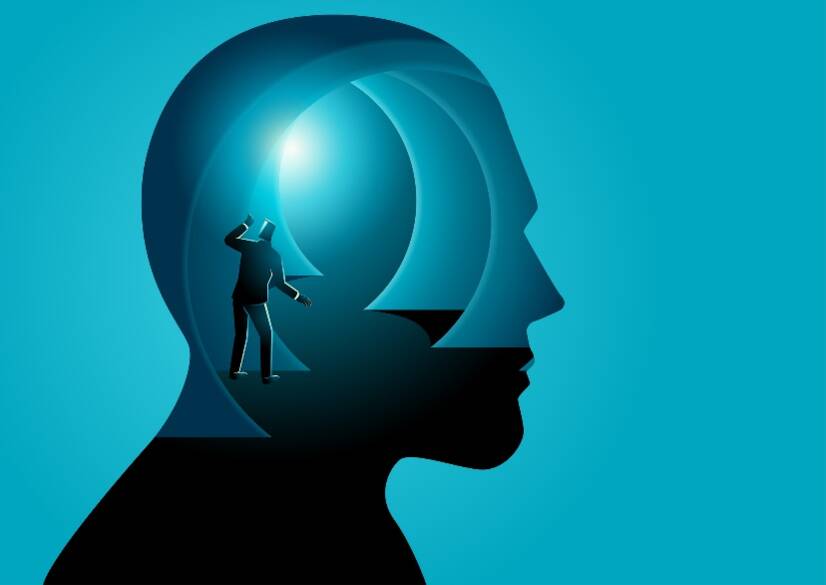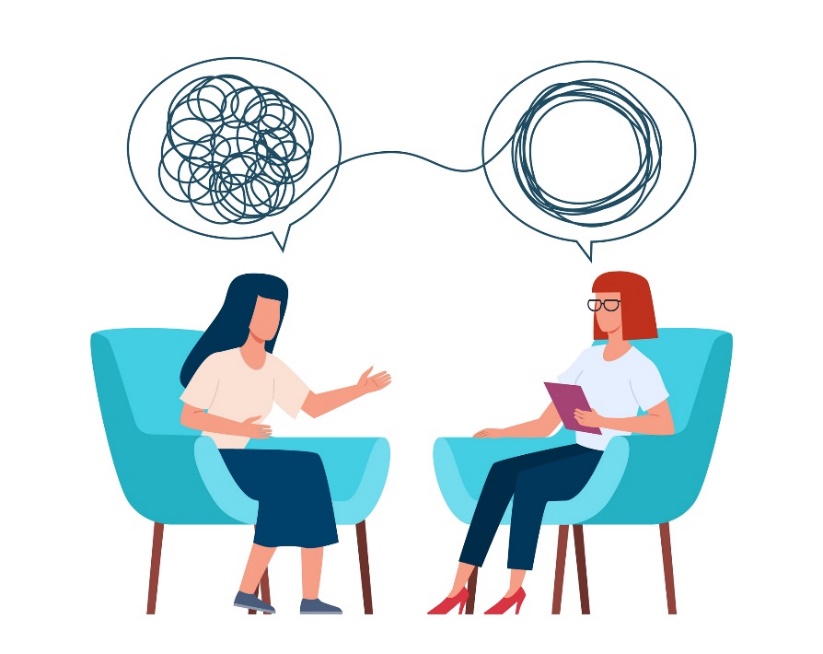- healthline.com - The difference between hallucinations and delusions. Healthline. Joslyn Jelinek, LCSW
- solen.sk - Schizophrenia and other psychotic disorders in the DSM-5. Solen. Jozef Dragašek, MD, PhD.
- medicalnewstoday.com - What to know about hallucinations. Medical News Today. Timothy J. Legg, PhD, PsyD
- psychiatriepropraxi.com - Delusional disorder and its treatment. Psychiatry for practice. Marie Ociskova, PhD et al.
- RABOCH, Jiří and Pavel PAVLOVSKÝ. Psychiatry. Second edition. Prague: Psychiatric Hospital: Charles University, Karolinum Publishing House, 2020. ISBN 978-80-246-4604-6.
What are hallucinations and delusions? Why do they arise? Diagnosis and treatment

Hallucinations, delusions and illusions are the most common manifestations of psychological disorders. Sometimes they can be short-lived. They are pathological thinking and a disturbance in the perception of reality. What is the difference between a hallucination and a delusion? When is it necessary to see a doctor?
Hallucinations and delusions are symptoms of various diseases, not only psychiatric ones. They are related to disturbances in perception of reality, consciousness or thinking.
The aetiology of their occurrence is very diverse. From the effects of alcohol and narcotics to psychiatric or neurological disorders.
Causes of hallucinations, diagnosis, treatment, psychotherapy and many other interesting information can be found in the article.
Hallucination, delusion or illusion?
Both hallucinations and delusions are disorders of sensory perception and thinking. The affected individual is convinced that the condition is a real one. Both conditions are similar and can be closely related.
Delusions
A delusion is a false, morbidly created belief. The affected individual cannot be convinced that it is not real. This thinking disorder is often found specifically in schizophrenia. It can be a symptom of many other neuropsychiatric disorders.
Delusions are often about being influenced, controlled, supernatural, or being in control. Delusions therefore represent an insistent belief in something that is false or unsubstantiated. It is a disorder of thinking.
Hallucinations
A hallucination is a false distorted perception of reality and real situations, objects or subjects. Hallucinations can involve all human senses such as sight, hearing, smell, touch or even taste.
The word hallucination is derived from the Latin word "alucinari", which means "mind wandering".
Hallucinations are caused by a chemical reaction or abnormality in the brain of the individual concerned. Hallucinations are a symptom of some psychiatric disorders, such as psychosis or schizophrenia. However, they can also be a direct result of the use of addictive and hallucinogenic substances.
In hallucinations, a person may or may not be aware that his or her experiences are not real. Hallucinations can be very unpleasant and distressing for the individual (spiders, snakes, ghosts, voices, smells...).
Illusions
While delusions are a disorder of thinking, illusions and hallucinations are referred to as perceptual disorders. In both of these cases, the individual perceives reality in a distorted way. Unlike hallucinations, illusions are based on a real object. The brain perceives the object but processes it incorrectly.
Hallucinations are caused by experiencing something that does not really exist. Illusions are caused by misinterpreting something real. Illusions are distorted perceptions of situations and objects. An example is a shadow resembling a ghost or a figure. A certain kind of illusion is also used by magicians.
Hallucinations: types, distribution and causes
Hallucinations can be divided into:
- Auditory (sound) hallucinations - This is the most common type of hallucination. The individual hears sounds or music that are real to them. Examples of auditory hallucinations are footsteps, banging, or people's voices. Some individuals hear voices commanding or advising them to do something.
- visual hallucinations - This type of common hallucination involves seeing things that are not real. These include objects, shapes, lights, and the like. It can also involve more complex visual hallucinations in the form of animals, people, or supernatural creatures similar to fairy tales.
- Tactile (touch) hallucinations - In a tactile hallucination, the individual feels a certain touch on their body. Usually this is an unpleasant sensation. Examples include the feeling of bugs crawling on the body, itching, burning, or movement of internal organs.
- Olfactory (smell) hallucinations - In these hallucinations, the individual may smell specific smells that do not exist and are not smelled by anyone else. These are primarily unpleasant foreign smells and odors.
- Gustatory hallucinations - These hallucinations evoke the sensation of tastes in the mouth that in most cases are foreign or unpleasant to the individual.
Causes of hallucinations
The etiology of hallucinations is very diverse and multifactorial. They may be temporary short-term causes or symptoms of long-term illnesses.
Temporary causes of hallucinations:
- The influence of alcohol
- Influence of narcotics (marijuana, LSD, amphetamine, heroin, cocaine and other various hallucinogens)
- Severe dehydration and exhaustion of the body
- Strong emotional phenomena (grief, trauma)
- Sleep deprivation
- Effects of anaesthesia
- High fever (especially in children and the elderly)
Diseases as causes of hallucinations
Serious physical organic diseases can cause certain hallucinations. These include tumours of the central nervous system, liver, kidney and other organ failure.
In addition, diseases of the nervous system, such as neurodegenerative Parkinson's disease in a high stage, Alzheimer's disease or a type of epilepsy with epileptic seizures.
Hallucinations are mainly a symptom of certain psychiatric diagnoses. In mental illnesses such as post-traumatic stress syndrome or schizophrenia, many patients have visual and auditory hallucinations.
Furthermore, delusional disorders and various psychotic disorders.
Examples of diseases with the possible occurrence of hallucinations:
- Schizophrenia
- Post-traumatic syndrome
- Dementia
- Alzheimer's disease
- Parkinson's disease
- Epilepsy
- Narcolepsy
- Bipolar disorder
- Psychosis
- Psychotic depression
Delusions: types, subdivisions and causes
Delusions and hallucinations occur mainly as symptoms of mental (psychiatric) and neurological disorders. Schizophrenia or psychotic illness are also examples.
Based on their nature, delusions can be divided into:
- Expansive delusions - The individual overestimates his or her own true qualities. He or she has a sense of exaggerated power, ability, and uniqueness. Expansive delusions are divided into megalomaniac (overestimation of one's own importance), religious (belief in origins), extrapotent (overestimation of one's own powers), reformist (beliefs to make revolutionary changes in society), and others.
- Depressive delusions - The individual, in turn, is subject to unfounded beliefs about his or her own insignificance and weakness. These are further divided into micromanic delusions (underestimation of self), hypochondriacal (beliefs about illness), autocausal (senseless self-blame), fearful (fear of catastrophic and negative events), dysmorphophobic (beliefs about the negative appearance of a body part), and others.
- Paranoid delusions - Divided into persecutory (beliefs about being persecuted and eavesdropped on by another person), transformational (beliefs about personality and body change), metamorphosis (beliefs about changing into another being or animal), emulative (unjustified morbid jealousy), and others.
Etiology of delusions
Delusions occur mainly in individuals with neurological and psychiatric diseases. Examples are neurodegenerative disorders (Parkinson's disease, Alzheimer's disease, multiple sclerosis, Pick's disease...) and other diseases of the nervous and vascular system (tumor, hemorrhage, trauma, atherosclerosis...).
Furthermore, they can occur in severe metabolic and endocrine diseases (Addison's, Cushing's syndrome...), vitamin deficiencies (B12, folic acid), and exposure to psychoactive narcotics, drugs and toxins.
Diagnosis and treatment of hallucinations and delusions
Hallucinations and delusions are disturbances of perception and thinking. The patient is convinced that they are reality. Whether it is a short-term or long-term condition, a professional assessment of the medical condition is necessary. If necessary, a therapeutic plan should be established.
Initially, the physician will take a comprehensive medical history, assess the patient's basic health and clinical symptoms. The practitioner will consider the symptoms described by the patient. Most likely, the patient will be referred to a specialist - a neurologist or psychiatrist.
The diagnosis of hallucinations and delusions is usually made as an interview with a psychiatrist. A neurological examination may be indicated to exclude an organic cause of the hallucinations.
A thorough diagnosis and knowledge of the etiology of the hallucinations is essential to establish a treatment plan and help the patient.
Treatment of psychiatric disorders is primarily through sessions with a therapist, lifestyle modification and medication therapy.
- Medication therapy
- Psychotherapy
- Lifestyle modification
Pharmacotherapy is mainly used to alleviate the unpleasant symptoms of the illness (schizophrenia, Alzheimer's disease, psychosis, dementia, depression...). In the case of an organic cause in the sense of a finding in the central nervous system, surgical treatment is also possible.
Antipsychotic drugs (neuroleptics) are a type of medication that are mainly used to treat psychoses, disorders of thinking (delusions) and perception (hallucinations). They are mainly manifested by their effect on dopamine and serotonin receptors of the central nervous system.
Antidepressants are drugs that have improved the treatment options for depressive and anxiety disorders due to their effect on the brain's chemical reactions.
Combined pharmacological treatment (antipsychotics, antidepressants...) and psychotherapy (cognitive behavioural therapy) are often used.
Psychotherapy consists in building a close therapeutic relationship between the therapist and the individual suffering from delusions or hallucinations. It requires the interest and cooperation of the patient.
Psychotherapy promotes the management of unwanted states, anxiety and pathological thinking with delusions. As a result, it improves the overall quality of life of the patient.
Several factors are crucial in selecting the exact type of psychotherapy. The psychotherapist can suggest the type of therapy and methods to the patient with respect to his/her health problem and personality. The patient decides what suits him/her best based on the information given by the therapist.
When is it appropriate to seek professional help from a doctor?
If you or someone you know is experiencing any type of hallucinations or delusions, a medical evaluation is advisable. Mental health is just as important as physical health.
Hallucinations can be dangerous, so don't be shy about discussing them with loved ones and a professional.
Hallucinations can cause an individual to feel anxious, paranoid and fearful. This can then lead to a significant reduction in the comfort of everyday life.
The psychological condition interferes with work and social life.
Untreated mental health problems can cause problems in personal relationships, family and working life and the labour market itself.

Diseases with symptom "Hallucinations and delusions"
Interesting resources
Related










